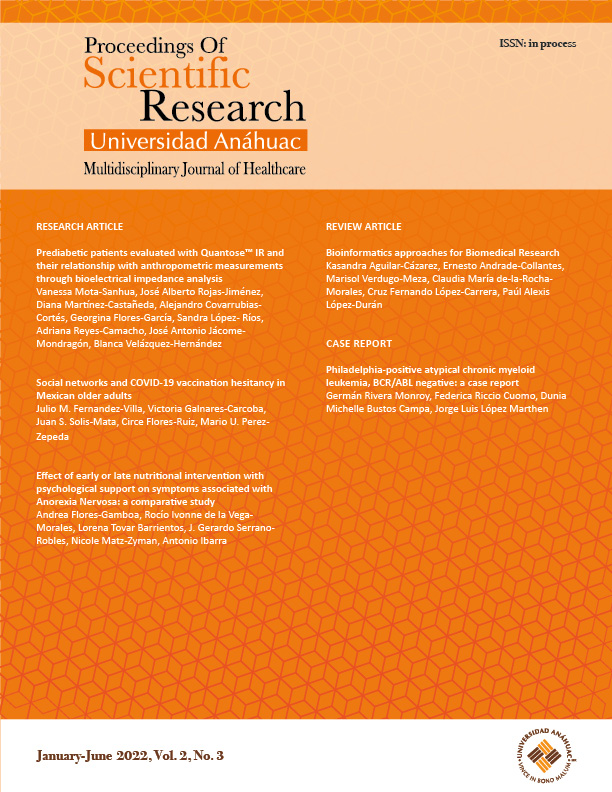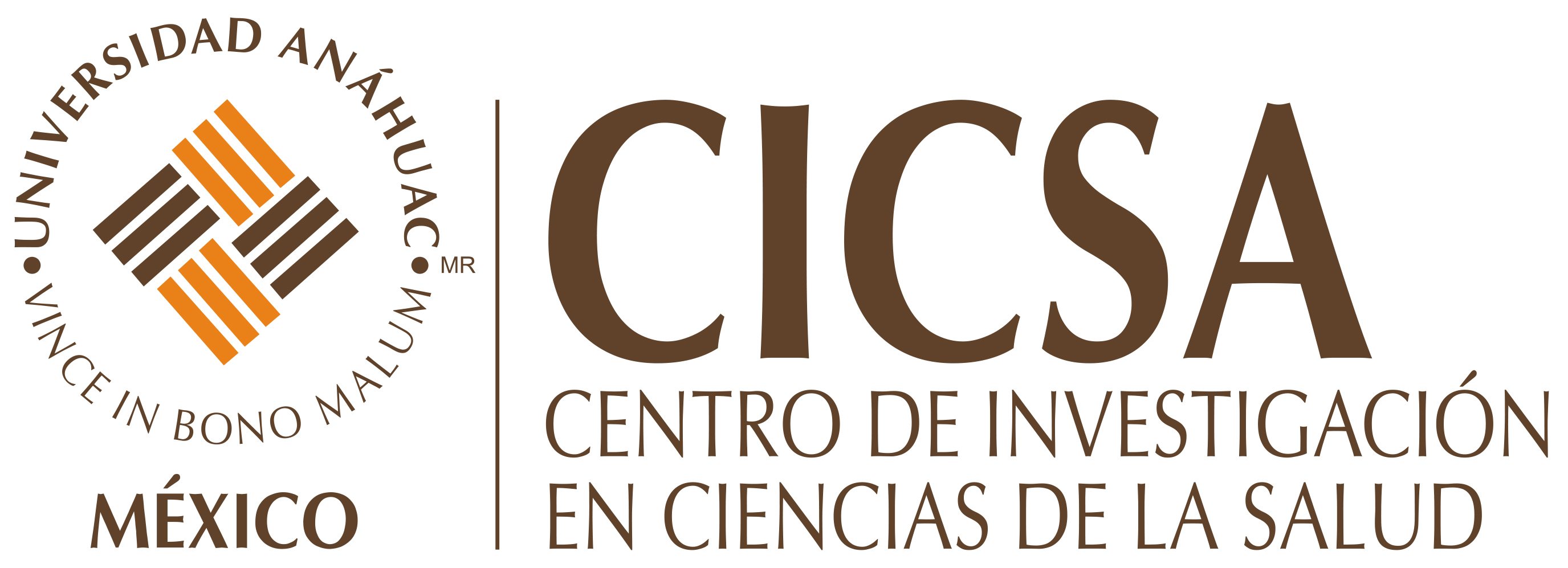Social networks and COVID-19 vaccination hesitancy in Mexican older adults
DOI:
https://doi.org/10.36105/psrua.2022v2n3.02Keywords:
ageing, social networks, older adults, covid-19 vaccination, sars-cov-2Abstract
Introduction: The importance of social networks is growing, impacting everyday life. At this stage of global COVID-19 vaccination roll-out, hesitancy to get immunized is slowing this process; it is thought that this decision could be impacted by information shared on social networks. Objective: Determine whether the use of social networks is associated with the willingness to get the COVID-19 vaccine. Methods: This is a secondary analysis of the ENSANUT COVID-19 study, that measures the impact of the pandemic on the Mexican population. Only older adults, aged 65 years or older, were included in this work. Face to face interviews were performed to determine social network utilization, willingness to get vaccinated, and socio-demographic information on health and COVID-19. Bivariate analysis and logistic regression were performed. Results: From a total of 1,490 older adults, 59.3 % were women whose mean age was 73.5 (SD 6.8), and 53.3% (n = 795) were willing to get a COVID-19 vaccine when available. In an adjusted multivariate logistic regression model, WhatsApp was found to be a significant variable related to lower risk of vaccine hesitancy (OR 0.43, 95% CI, 0.2–0.85; p = 0.016). Other variables related to vaccine hesitancy were being a woman (OR 1.58, 95% CI, 2–1.23; p < 0.001) and COVID-19 literacy (OR 1.32, 95% CI, 1.01–1.74; p = 0.047). Conclusion: The use of social networks such as WhatsApp is a factor that can influence older adult vaccination against COVID-19. Social networks, among other variables, should be taken into account when analyzing factors that lead to vaccination hesitancy in older adults.
Downloads
PLUMX metrics
References
Cuevas-Maraver J, Kevrekidis PG, Chen QY, et al. Lockdown measures and their impact on single- and two-age-structured epidemic model for the COVID-19 outbreak in Mexico. Math Biosci. Jun 2021;336:108590. https://doi.org/10.1016/j.mbs.2021.108590
Christie A, Henley S, Mattocks L, et al. Decreases in COVID-19 Cases, Emergency Department Visits, Hospital Admissions, and Deaths Among Older Adults Following the Introduction of COVID-19 Vaccine - United States, September 6, 2020-May 1, 2021. MMWR Morbidity and mortality weekly report. 06/11/2021 2021;70(23). https://doi.org/10.15585/mmwr.mm7023e2
Lopez Bernal J, Andrews N, Gower C, Robertson C, Stowe J, Tessier E et al. Effectiveness of the Pfizer-BioNTech and Oxford-AstraZeneca vaccines on covid-19 related symptoms, hospital admissions, and mortality in older adults in England: test negative case-control study BMJ 2021; 373 :n1088. https://doi.org/10.1136/bmj.n1088
Iyengar KP, Ish P, Botchu R, Jain VK, Vaishya R. Influence of the Peltzman effect on the recurrent COVID-19 waves in Europe. Postgrad Med J. Apr 29 2021. https://doi.org/10.1136/postgradmedj-2021-140234
Wilson SL, Wiysonge C. Social media and vaccine hesitancy. BMJ Glob Health. Oct 2020;5(10). https://doi.org/10.1136/bmjgh-2020-004206
Solis Arce JS, Warren SS, Meriggi NF, et al. COVID-19 vaccine acceptance and hesitancy in low- and middle-income countries. Nat Med. Jul 16 2021. https://doi.org/10.1038/s41591-021-01454-y
Berry SD, Johnson KS, Myles L, et al. Lessons learned from frontline skilled nursing facility staff regarding COVID‐19 vaccine hesitancy. Journal of the American Geriatrics Society. 2021;69(5):1140-1146. https://doi.org/10.1111/jgs.17136
Nikolovski J, Koldijk M, Weverling G, et al. Factors indicating intention to vaccinate with a COVID-19 vaccine among older U.S. adults. PloS one. 05/24/2021 2021;16(5). https://doi.org/10.1371/journal.pone.0251963
Oliveira BLCA de, Campos MAG, Queiroz RC de S, Britto e Alves MTSS de, Souza BF de, Santos AM dos, Silva AAM da. Prevalence and factors associated with covid-19 vaccine hesitancy in Maranhão, Brazil. Rev. saúde pública [Internet]. 2021Apr.23 [cited 2022Apr.1];55:12. Available from: https://www.revistas.usp.br/rsp/article/view/184862. https://doi.org/10.11606/s1518-8787.2021055003417.
García-Saisó S, Marti M, Brooks I, Curioso WH, González D, Malek V, et al. Infodemia en tiempos de COVID-19. Rev Panam Salud Publica. 2021;45:e89. https://doi.org/10.26633/RPSP.2021.89
Bono SA, Faria De Moura Villela E, Siau CS, et al. Factors Affecting COVID-19 Vaccine Acceptance: An International Survey among Low- and Middle-Income Countries. Vaccines. 2021;9(5):515. https://doi.org/10.3390/vaccines9050515
WHO. La desinformación se ha convertido en una industria y puede causar más muertes que la COVID-19: experto - ONU México | Enfermedad por el Coronavirus (COVID-19). WHO. 20 Julio, 2021. Updated 2021-07-16. Accessed 16 Julio, 2021. https://coronavirus.onu.org.mx/la-desinformacion-se-ha-convertido-en-una-industria-y-puede-causar-mas-muertes-que-la-covid-19-experto
Fingerman KL, Ng YT, Zhang S, et al. Living Alone During COVID-19: Social Contact and Emotional Well-being Among Older Adults. J Gerontol B Psychol Sci Soc Sci. Feb 17 2021;76(3):e116-e121. https://doi.org/10.1093/geronb/gbaa200
Teresa SL. Encuesta Nacional de Salud y Nutrición. https://ensanut.insp.mx/encuestas/ensanutcontinua2020/index.php. 18 Julio, 2021. Accessed 14 Agosto, 2020. https://ensanut.insp.mx/encuestas/ensanutcontinua2020/index.php
La OPS confirma tercera ola de COVID-19 en México. 2021-07-08. https://politica.expansion.mx/mexico/2021/07/08/la-ops-confirma-tercera-ola-de-covid-19-en-mexico
Huntley AL, Johnson R, Purdy S, Valderas JM, Salisbury C. Measures of multimorbidity and morbidity burden for use in primary care and community settings: a systematic review and guide. Ann Fam Med. Mar-Apr 2012;10(2):134-41. https://doi.org/10.1370/afm.1363
Koirala A, Joo YJ, Khatami A, Chiu C, Britton PN. Vaccines for COVID-19: The current state of play. Paediatr Respir Rev. Sep 2020;35:43-49. https://doi.org/10.1016/j.prrv.2020.06.010
Ritchie H, Ortiz-Ospina E, Beltekian D, et al. Coronavirus Pandemic (COVID-19). Our World in Data. 2021; Health MMo. COVID Vaccination. Mexican Minister of Health. Accessed 30/07/2021, 2021.
Cesari M, Vellas B. Older Persons "Lost" to the COVID-19 Vaccination: Where Are They? The Journal of frailty & aging. 2021;10(4):308-309. https://doi.org/10.14283/jfa.2021.37
Ritchie H, Ortiz-Ospina E, Beltekian D, et al. Coronavirus Pandemic (COVID-19). Our World in Data https://ourworldindata.org/coronavirus
Forman R, Shah S, Jeurissen P, Jit M, Mossialos E. COVID-19 vaccine challenges: What have we learned so far and what remains to be done? Health policy (Amsterdam, Netherlands). 2021;125(5):553-567. https://doi.org/10.1016/j.healthpol.2021.03.013
Bono SA, Faria de Moura Villela E, Siau CS, Chen WS, Pengpid S, Hasan MT, Sessou P, Ditekemena JD, Amodan BO, Hosseinipour MC, Dolo H, Siewe Fodjo JN, Low WY, Colebunders R. Factors Affecting COVID-19 Vaccine Acceptance: An International Survey among Low- and Middle-Income Countries. Vaccines. 2021; 9(5):515. https://doi.org/10.3390/vaccines9050515
Solís Arce JS, Warren SS, Meriggi NF, Scacco A, McMurry N, Voors M et al. COVID-19 vaccine acceptance and hesitancy in low- and middle-income countries. Nature Medicine. 2021 Aug;27(8):1385-1394. https://doi.org/10.1038/s41591-021-01454-y
Wilson SL, Wiysonge C. Social media and vaccine hesitancy. 2020-10-01 2020. https://doi.org/10.1136/bmjgh-2020-004206
Meese J, Frith J, Wilken R. COVID-19, 5G conspiracies and infrastructural futures. Media International Australia. 2020;177(1):30-46. https://doi.org/10.1177/1329878x20952165
Hülür G, Macdonald B. Rethinking social relationships in old age: Digitalization and the social lives of older adults. Am Psychol. May-Jun 2020;75(4):554-566. https://doi.org/10.1037/amp0000604
Hämmerle V, Pauli C, Braunwalder R, Misoch S. WhatsApp's Influence on Social Relationships of Older Adults. 2020:93-98. https://doi.org/10.5220/0009470100930098
France24_en. Mandatory vaccination, Covid-19 pass and access to PCR tests: the main points from Macron's address. FRANCE24. Updated 2021-07-12. https://www.france24.com/en/europe/20210712-follow-live-france-s-macron-addresses-the-nation-as-covid-19-delta-variant-surges
@whitehouse. Remarks by President Biden on the COVID-19 Response and the Vaccination Program | The White House. 2021-05-17 2021
office Mp. Presidente llama a vacunarse contra COVID-19 para salvar vidas; 40% de la poblacion mayor de 18 años ha sido protegida-Presidente de Mexico. 17 Julio, 2021. Accessed 13 Julio, 2021. https://presidente.gob.mx/presidente-llama-a-vacunarse-contra-covid-19-para-salvar-vidas-40-de-la-poblacion-mayor-de-18-anos-ha-sido-protegida/
Chopik WJ. The Benefits of Social Technology Use Among Older Adults Are Mediated by Reduced Loneliness. Cyberpsychology, Behavior, and Social Networking. 2016;19(9):551-556. https://doi.org/10.1089/cyber.2016.0151
Sims, T, Reed, A E, & Carr, D C. Information and communication technology use is related to higher well-being among the oldest-old. The Journals of Gerontology: Series B, 2017;72(5), 761-770. https://doi.org/10.1093/geronb/gbw130Union IT. Ageing in a digital world-from vulnerable to valuable. 2021. https://www.itu.int/hub/publication/D-PHCB-DIG_AGE- 2021/
Hajek A, König HH. Frequency of contact with friends and relatives via internet and psychosocial factors in middle-aged and older adults during the COVID-19 pandemic. Findings from the German Ageing Survey. Int J Geriatr Psychiatry. Sep 9 2021. https://doi.org/10.1002/gps.5623
Union IT. Ageing in a digital world-from vulnerable tovaluable. 2021. https://www.itu.int/hub/publication/D-PHCB-DIG_AGE-2021/
Hajek A, König HH. Frequency of contact with friends and relatives via internet and psychosocial factors in middle- aged and older adults during the COVID-19 pandemic. Findings from the German Ageing Survey. Int J Geriatr Psychiatry. Sep 9 2021. https://doi.org/10.1002/gps.5623
Encuesta Nacional de Salud y Nutrición. https://ensanut.insp.mx/encuestas/ensanutcontinua2020/index.php. https://ensanut.insp.mx/encuestas/ensanutcontinua2020/index.php

Downloads
Published
How to Cite
Issue
Section
License
Copyright (c) 2022 Julio M. Fernandez-Villa, Victoria Galnares-Carcoba, Juan S. Solis-Mata, Circe Flores-Ruiz, Mario U. Perez-Zepeda

This work is licensed under a Creative Commons Attribution-NonCommercial-NoDerivatives 4.0 International License.
All the intellectual content found in this publication is licensed to the consumer public under the figure of Creative Commons©, unless the author of said content has agreed otherwise or limited said faculty to "Proceedings of Scientific Research Universidad Anáhuac. Multidisciplinary Journal of Healthcare©" or "Universidad Anáhuac Mexico©" in writing and expressly.
Proceedings of Scientific Research Universidad Anáhuac. Multidisciplinary Journal of Healthcare is distributed under a Creative Commons Attribution-NonCommercial-NoDerivatives 4.0 International License.
The author retains the economic rights without restrictions and guarantees the journal the right to be the first publication of the work. The author is free to publish his article in any other medium, such as an institutional repository.












